 Petzlover
Petzlover Goldador is originated from United States but Great Pyrenees is originated from France. Goldador may grow 21 cm / 8 inches shorter than Great Pyrenees. Goldador may weigh 18 kg / 39 pounds lesser than Great Pyrenees. Goldador may live 3 years more than Great Pyrenees. Both Goldador and Great Pyrenees has same litter size. Goldador requires Low Maintenance. But Great Pyrenees requires Moderate Maintenance
Goldador is originated from United States but Great Pyrenees is originated from France. Goldador may grow 21 cm / 8 inches shorter than Great Pyrenees. Goldador may weigh 18 kg / 39 pounds lesser than Great Pyrenees. Goldador may live 3 years more than Great Pyrenees. Both Goldador and Great Pyrenees has same litter size. Goldador requires Low Maintenance. But Great Pyrenees requires Moderate Maintenance
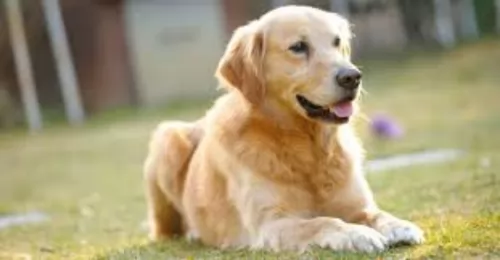 Introduced as a designer dog, the Goldador is beautiful – a mix between Golden Retrievers and Labrador Retrievers, two of the most popular dog breeds in the world.
Introduced as a designer dog, the Goldador is beautiful – a mix between Golden Retrievers and Labrador Retrievers, two of the most popular dog breeds in the world.
The dog was specifically bred to be an excellent working dog, and in fact today he makes the most wonderful guide-, rescue- and therapy dog.
Known also as Golden Labradors, the Goldador is a dog that has many capabilities, one of which is to make a wonderful family pet. As a designer breed, the dog isn’t recognized as a standardized breed by any of the major kennel clubs.
 The Great Pyrenees could be from Spain or France because the dog hails from the Pyrenees Mountains, which spans both France and Spain.
The Great Pyrenees could be from Spain or France because the dog hails from the Pyrenees Mountains, which spans both France and Spain.
The dog was used to defend flocks from predators but its lineage goes a long way back, thousands of years in fact. It is thought that they only arrived in Europe about 5,000 years ago. The dog was adopted into the court of Louis the XIV as a royal dog.
During the mid 1600s, the dog's numbers dwindled but the French developed kennel clubs where the dog could be bred and its numbers restored. It was in 1933 that the Great Pyrenees received American Kennel Club recognition.
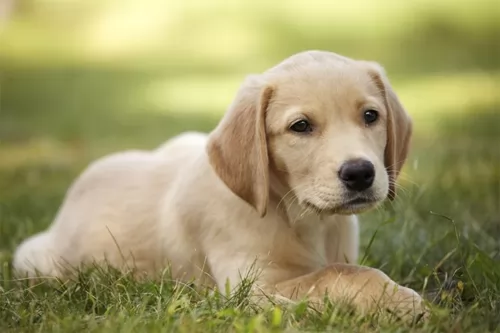 The Goldador is a large muscular dog standing at between 56 – 61cm in height at the withers and weighing between 27 – 36kg in weight.
The Goldador is a large muscular dog standing at between 56 – 61cm in height at the withers and weighing between 27 – 36kg in weight.
His double coat is short and smooth but in can also be longer. It comes in shades of gold or yellow with hints of red, but it can be liver or black too. Goldadors are well-balanced dogs, and just the look in their kind brown eyes makes you realize that this beautiful dog can make a wonderful pet.
He has a well proportioned head with medium length floppy ears, a black nose and a long tail.
Loving, intelligent, loyal and playful, the Goldador is the kind of dog that gets on well with everyone. It’s why he isn’t a particularly good watchdog as he is just too friendly with strangers. You have to be careful though – his rambunctious nature, his energy and playfulness can see him being a bit rough around small children or the elderly. It is why socialization and training are so important for him as then he becomes obedient and more relaxed around everyone.
He loves his human family and never wants to be left on his own for too long. Intelligent and alert, he is an easy dog to train as he makes it easier by being a dog that wants to please.
 This is a beautiful dog, noticeable by the essentially white coat and his overall size, standing at 70 to 82cm and weighing between 40 to 54 kg.
This is a beautiful dog, noticeable by the essentially white coat and his overall size, standing at 70 to 82cm and weighing between 40 to 54 kg.
The double coat is medium to long, coarse and straight or wavy and and it can be solid white, cream or white with patches of light tan or grey.
The nose is black, the eyes brown, the ears of medium length and floppy and the tail long and plumed.
The Great Pyrenees is an intelligent, strong willed dog with a mind of his own so he will be able to be trained and socialized successfully.
His huge size will require that he be trained because when he is indoors he can knock things over and he must be able to respond to you telling him to lie down.
As a large dog, he isn’t suited for tiny homes, as he requires lots of space even though he doesn’t require a lot of exercise. Not only that, he takes his watchdog duties seriously and he is inclined to bark a lot, and in a small place, you’ll be getting constant complaints from the neighbors.
When trained and socialized, your big dog is social, active and loving. He gets on well with children, the elderly and with pets in the home. He isn’t that overly active and will happily make himself at home on your couch and bed.
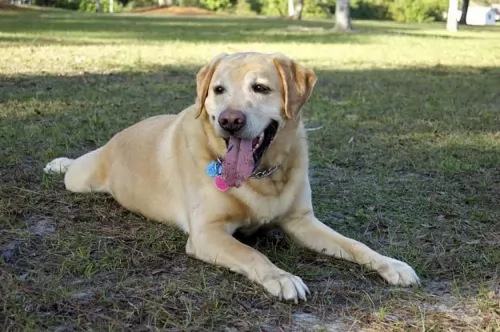 Goldadors are intelligent dogs and they’ve been used extensively for guide- and therapy dogs, loving to be useful and busy. Its the kind of dog that thrives in a loving, active family – one that counts him in as a family member.
Goldadors are intelligent dogs and they’ve been used extensively for guide- and therapy dogs, loving to be useful and busy. Its the kind of dog that thrives in a loving, active family – one that counts him in as a family member.
He makes an exceptional family pet and companion and you can rely on him to be a loyal, loving pet.It’s why the Goldador is becoming such a sought after pet – he simply ticks all the right boxes.
 The Great Pyrenees is such a calm, independent, serious, well-mannered dog who loves to be around his human family and to please them. He is gentle and knows how to behave well around children, the elderly as well as with any pets in the home.
The Great Pyrenees is such a calm, independent, serious, well-mannered dog who loves to be around his human family and to please them. He is gentle and knows how to behave well around children, the elderly as well as with any pets in the home.
He makes a wonderful companion and although he loves indoor life as much as outdoor life, he is much happier settling into life in the country or the suburbs as opposed to life in the city and a tiny property.
Give your big white coated pet all the love he thrives on, and you'll enjoy a wonderful relationship with this large, amicable dog.
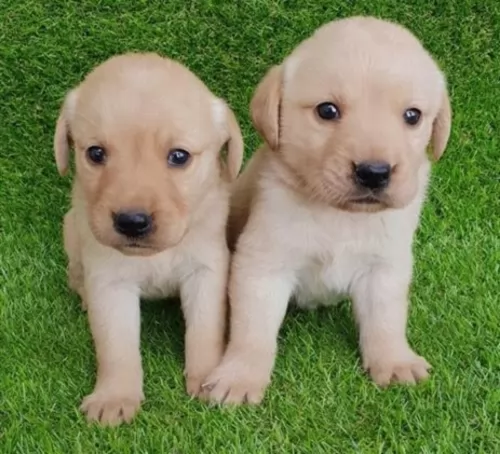 Goldadors luckily don’t have many health issues, and as a hybrid, he has fewer health issues than pure breds.
Goldadors luckily don’t have many health issues, and as a hybrid, he has fewer health issues than pure breds.
You can say with confidence that a nutritious diet, regular exercise, good grooming, lots of love and attention and visits to the vet if your pet is ill are key aspects for maintaining good health.
There are always going to be some common health problems that your Goldie could get -
You’ll need to be checking your Labrador Retriever's floppy ears. They don’t get as much air in them as a dog with erect ears. A dog like the Goldador with floppy ears will need to have his ears cleaned for bacteria. Be very careful how you clean your pet’s ears as you can damage them if you probe too deeply.
Did you know that by spaying or neutering your Goldador can save them from getting some serious illnesses later on? Speak to your vet about it when your pet reaches 9 months to a year of age.
Goldadors can easily put on weight if they aren’t given enough daily exercise to burn off the calories. Some put on weight after being spayed or neutered and it's important to watch their weight after these procedures. Being overweight puts a lot of extra strain on a dog’s internal organs.
 Your Great Pyrenees is a big dog with an average lifespan of 10 to 12 years. His large size means you will need to look out for typical 'big dog' ailments such as hip dysplasia.
Your Great Pyrenees is a big dog with an average lifespan of 10 to 12 years. His large size means you will need to look out for typical 'big dog' ailments such as hip dysplasia.
This problem can cause your pet to be in pain and he can also become lame, battling to walk and play and battling to get up after lying down.
Also, look out for bone cancer with your pet and as mentioned previously, bloat, which is a life threatening disease where the stomach of the dog swells up.
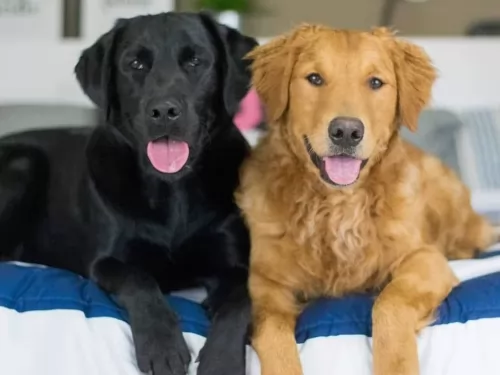 Goom your Goldador regularly. He can either have short- or long hair, but he is a fairly low maintenance dog so a good brush twice a week to remove loose hairs will be good for him.
Goom your Goldador regularly. He can either have short- or long hair, but he is a fairly low maintenance dog so a good brush twice a week to remove loose hairs will be good for him.
Diet is everything, and by giving your Goldador nutritional food, you can actually lengthen his life. If you’re going to be giving him commercially manufactured food, follow the feeding guidelines on the packaging. Remember there are foods that cater specifically for a dogs age and his energy levels.
Try and give him some home-made food from time to time such as cooked rice, vegetables and chicken as well as some raw meat occasionally as this can ensure his skin and coat remain healthy.
Always provide plenty of cool, fresh water, especially seeing that he will be thirsty after a long walk or other exercise. Dehydration in a dog can be fatal.
Provide your Goldador with a warm, dry place to sleep. Make sure that it offers shelter from the sun and rain and also provides shade.
 Your Great Pyrenees isn't going to be a dog leaping around you demanding a game or walk like what you get from some energetic dogs. He certainly doesn't require strenuous exercise but will require a nice, brisk walk every day. Give him some ball or rope games too. He's territorial and likes large grounds to walk around and guard and this constant guarding is a good form of exercise too.
Your Great Pyrenees isn't going to be a dog leaping around you demanding a game or walk like what you get from some energetic dogs. He certainly doesn't require strenuous exercise but will require a nice, brisk walk every day. Give him some ball or rope games too. He's territorial and likes large grounds to walk around and guard and this constant guarding is a good form of exercise too.
With two layers, the coat of the Great Pyrenees will need to be brushed twice a week to prevent burrs attaching to the fur and to prevent it from matting, It also gets rid of loose hair during shedding.
He tends to drool so it's handy keeping a damp cloth close by just to give his face area a wipe down. Your dog's ears will need to be cleaned with special ear-cleaning lotion and his nails will also need to be trimmed.
Socialize your Great Pyrenees with other dogs and people from a young age. Without proper socialization, this breed can become territorial and possessive of his family, which could lead to aggression. He bonds with his family but tends to be wary of strangers.
It is far better to feed your Great Pyrenees smaller meals throughout the day as opposed to 2 large meals a day. A large dog like him can develop bloat from gulping down a large amount of food too quickly.
If you feed your Great Pyrenees commercially manufactured food, make sure it is high in omega 3 and 6 to keep his thick white coat luxurious.
Your dog will need a dog food targeted at a large breed. Remember to include some raw meat as well as cooked chicken, vegetables and brown rice into his kibble and always ensure fresh, cool water is available.